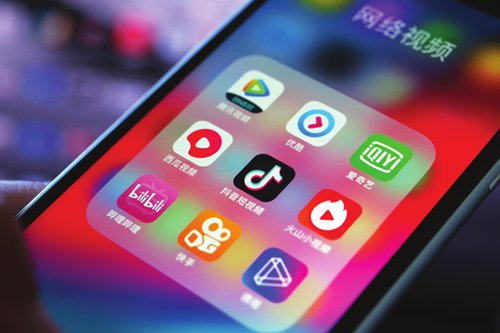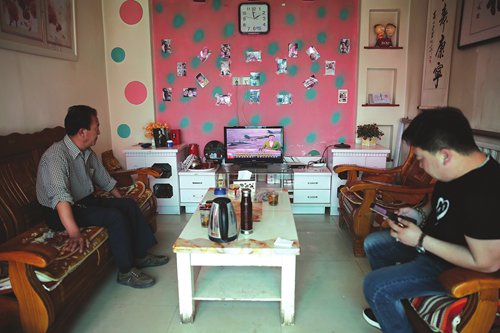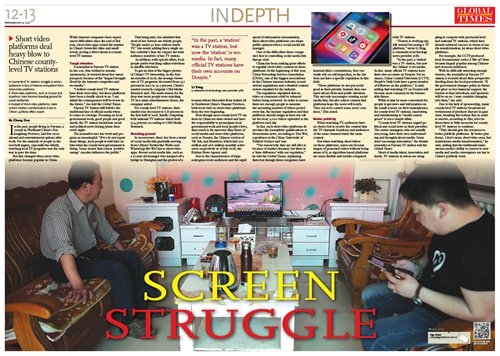HOME >> CHINA
Short video platforms deal heavy blow to Chinese county-level TV stations
By Zhang Dan Source:Global Times Published: 2019/6/18 18:48:41
○ County-level TV stations struggle to attract audiences in face of intense competition from short-video platforms
○ Short-video platforms, such as Douyin and Kuaishou, have become breeding ground for social media hits
○ Instead of short video platforms, mainstream media's transformation is key to China's publicity effect: expert

But this changed when short video platforms became popular in China. While internet companies have experienced difficulties since the end of last year, short video apps seized the market in China's lower-tier cities and small towns, posing a direct threat to county-level TV stations.
Tough situation
A journalist at Fuyuan TV station in her 20s, who wished to remain anonymous, is worried about her career prospects because of the "impact brought about by the internet companies and we-media."
"I believe county-level TV stations have their own value, but those platforms have been a deadly shock to us. I am afraid the consequences will be worse in the future," she told the Global Times.
Fuyuan TV Station still follows the traditional line of official media when it comes to coverage. Focusing on local government work, good people and good deeds, the TV station broadcasts social and political news during prime time every night.
The journalist sees her work and program as meaningful: "If we do not report these things, local people would have no idea what the county-level government is doing. Some stories that convey 'positive energy' can also influence the public."
That being said, she admitted that most of her viewers are elderly people. "People under 30 here seldom watch TV," she noted, adding that a single online celebrity's fans far surpass the total audience numbers of her TV station.
In addition, with special offers, local people prefer watching online television to satellite television.
To get an idea of the bigger picture of China's TV viewership, in the first six months of 2018, the average viewer rate of TV programs decreased from 57.1 percent in 2017 to 52.5 percent, China's market research company CSM Media Research said. The main reason for the drop was more people were rejecting TV as a main entertainment choice, the company added.
For county-level TV stations, their market size decreased to 6.8 percent in the first half of 2018, hardly competing with national TV stations which hold 31.4 percent, according to CSM Media Research.
Breeding ground
In recent years, there has been a trend of social media hits gradually moving from China's Twitter-like Weibo and WhatsApp-like WeChat to short video apps. Recent social media hits, such as a 17-year-old teenager who jumped off a bridge in Shanghai and the protest of a woman whose Mercedes-Benz leaked oil in Northwest China's Shaanxi Province, both went viral on short-video platforms from the very beginning.
Even though most county-level TV stations in China are state-owned and have the responsibility to promulgate local government work and local people's lives, their reach is far narrower than those of social media and short video platforms, such as Douyin, the Chinese version of Tik Tok, and Kuaishou, which had 500 million and 266 million monthly active users respectively as of July 2018, the Xinhua News Agency said.
Due to the characteristics of large-scale grass-roots audiences and the rapid speed of information transmission, these short-video platforms can shape public opinion when a social media hit emerges.
One of the difficulties these companies face is controlling social media hits that go viral.

The regulation stipulated that no video or comment could be released before being reviewed. In order to ensure there are enough people to examine the mounting number of videos posted every day, the January regulation said that platforms should assign at least one editor for every 1,000 videos uploaded to the platform each day.
In fact, such short video platforms do not have the journalistic qualifications to disseminate news, according to Zhu Wei, a professor at the China University of Political Science and Law.
"The reason why they are still alive is because of market demand, but there is a 'time difference' with our regulation," he told the Global Times, explaining that even though these companies have internal ethics commissions, they currently rely on self-inspection, as the law does not have a specific regulation in this field.
"These platforms do not put social good as their priority. Instead, they care more about clicks and public attention. This not only encourages creating social media hits, but also selects content that platforms hope the users will watch. They can even control some users' reactions," Zhu noted.
Better publicity
When watching TV, audiences have no choice but to receive the content that the TV channels broadcast and audiences of the same channel watch the same content.
But when watching short videos on those platforms, users can become targets of promoted videos without being aware of it, as algorithm-based platforms are more flexible and mobile compared with TV stations.
"Douyin is evolving rapidly toward becoming a TV platform," wrote Li Xing, a columnist at technology news provider 36Kr.
"In the past, a 'station' was a TV station, but now the 'station' is we-media. In fact, many official TV stations have their own accounts on Douyin. For instance, China Central Television (CCTV), People's Daily both have a great number of followers on the platform," Li said, adding that watching TV on Douyin will become more common in the foreseeable future.
While it may be more convenient for people to get news and information on the small screens on their smartphones, for county-level TV stations, innovating and transforming to "media convergence" is not a simple affair.

"County-level TV stations regard political and social news as their priorities. The senior managers, who are usually not young, have their own understanding and thoughts about media. Some don't encourage innovation," the female journalist at Fuyuan TV station told the Global Times.
Short of media talent, innovation and funds, TV stations in towns are struggling to compete with provincial-level and national TV stations, which have already achieved success in terms of media transformation, let alone short video platforms.
For example, the CCTV-produced food documentary series A Bite of China became hugely popular among Chinese and overseas audiences.
With its difficulty attracting enough viewers, the journalist at Fuyuan TV station is worried about their prospective funding from the local government. "If the government changes policy in future and gives us less financial support, the burden to find advertisers and sponsors will be on us. I may consider changing jobs then," she said.
Due to the lack of sponsorship, many county-level TV stations broadcast advertisement of products that are in gray zone, breaking the bottom line in order to survive, according to Zhu, who believes there is little necessity for county-level TV stations to continue.
"They should give the resources to better publicity platforms. By better platforms, I don't mean short video ones, but mainstream media transformation," he said, adding that the traditional mainstream media's ability to convert to new media and media convergence are key to China's publicity work.

Newspaper headline: Screen struggle
○ Short-video platforms, such as Douyin and Kuaishou, have become breeding ground for social media hits
○ Instead of short video platforms, mainstream media's transformation is key to China's publicity effect: expert

Photo: VCG
In the past, people living in Fuyuan, a county in Northeast China's Heilongjiang Province, had few recreational and entertainment options after work. For the majority of people in the rust-belt region, especially the elderly, watching local TV programs was the only way to pass the time.But this changed when short video platforms became popular in China. While internet companies have experienced difficulties since the end of last year, short video apps seized the market in China's lower-tier cities and small towns, posing a direct threat to county-level TV stations.
Tough situation
A journalist at Fuyuan TV station in her 20s, who wished to remain anonymous, is worried about her career prospects because of the "impact brought about by the internet companies and we-media."
"I believe county-level TV stations have their own value, but those platforms have been a deadly shock to us. I am afraid the consequences will be worse in the future," she told the Global Times.
Fuyuan TV Station still follows the traditional line of official media when it comes to coverage. Focusing on local government work, good people and good deeds, the TV station broadcasts social and political news during prime time every night.
The journalist sees her work and program as meaningful: "If we do not report these things, local people would have no idea what the county-level government is doing. Some stories that convey 'positive energy' can also influence the public."
That being said, she admitted that most of her viewers are elderly people. "People under 30 here seldom watch TV," she noted, adding that a single online celebrity's fans far surpass the total audience numbers of her TV station.
In addition, with special offers, local people prefer watching online television to satellite television.
To get an idea of the bigger picture of China's TV viewership, in the first six months of 2018, the average viewer rate of TV programs decreased from 57.1 percent in 2017 to 52.5 percent, China's market research company CSM Media Research said. The main reason for the drop was more people were rejecting TV as a main entertainment choice, the company added.
For county-level TV stations, their market size decreased to 6.8 percent in the first half of 2018, hardly competing with national TV stations which hold 31.4 percent, according to CSM Media Research.
Breeding ground
In recent years, there has been a trend of social media hits gradually moving from China's Twitter-like Weibo and WhatsApp-like WeChat to short video apps. Recent social media hits, such as a 17-year-old teenager who jumped off a bridge in Shanghai and the protest of a woman whose Mercedes-Benz leaked oil in Northwest China's Shaanxi Province, both went viral on short-video platforms from the very beginning.
Even though most county-level TV stations in China are state-owned and have the responsibility to promulgate local government work and local people's lives, their reach is far narrower than those of social media and short video platforms, such as Douyin, the Chinese version of Tik Tok, and Kuaishou, which had 500 million and 266 million monthly active users respectively as of July 2018, the Xinhua News Agency said.
Due to the characteristics of large-scale grass-roots audiences and the rapid speed of information transmission, these short-video platforms can shape public opinion when a social media hit emerges.
One of the difficulties these companies face is controlling social media hits that go viral.

Photo: VCG
China has been making great efforts to regulate short video content on those platforms. At the beginning of this year, China Netcasting Services Association (CNSA), one of the biggest associations in the Chinese internet industry, issued stricter regulations and a detailed content review standard for the industry.The regulation stipulated that no video or comment could be released before being reviewed. In order to ensure there are enough people to examine the mounting number of videos posted every day, the January regulation said that platforms should assign at least one editor for every 1,000 videos uploaded to the platform each day.
In fact, such short video platforms do not have the journalistic qualifications to disseminate news, according to Zhu Wei, a professor at the China University of Political Science and Law.
"The reason why they are still alive is because of market demand, but there is a 'time difference' with our regulation," he told the Global Times, explaining that even though these companies have internal ethics commissions, they currently rely on self-inspection, as the law does not have a specific regulation in this field.
"These platforms do not put social good as their priority. Instead, they care more about clicks and public attention. This not only encourages creating social media hits, but also selects content that platforms hope the users will watch. They can even control some users' reactions," Zhu noted.
Better publicity
When watching TV, audiences have no choice but to receive the content that the TV channels broadcast and audiences of the same channel watch the same content.
But when watching short videos on those platforms, users can become targets of promoted videos without being aware of it, as algorithm-based platforms are more flexible and mobile compared with TV stations.
"Douyin is evolving rapidly toward becoming a TV platform," wrote Li Xing, a columnist at technology news provider 36Kr.
"In the past, a 'station' was a TV station, but now the 'station' is we-media. In fact, many official TV stations have their own accounts on Douyin. For instance, China Central Television (CCTV), People's Daily both have a great number of followers on the platform," Li said, adding that watching TV on Douyin will become more common in the foreseeable future.
While it may be more convenient for people to get news and information on the small screens on their smartphones, for county-level TV stations, innovating and transforming to "media convergence" is not a simple affair.

"County-level TV stations regard political and social news as their priorities. The senior managers, who are usually not young, have their own understanding and thoughts about media. Some don't encourage innovation," the female journalist at Fuyuan TV station told the Global Times.
Short of media talent, innovation and funds, TV stations in towns are struggling to compete with provincial-level and national TV stations, which have already achieved success in terms of media transformation, let alone short video platforms.
For example, the CCTV-produced food documentary series A Bite of China became hugely popular among Chinese and overseas audiences.
With its difficulty attracting enough viewers, the journalist at Fuyuan TV station is worried about their prospective funding from the local government. "If the government changes policy in future and gives us less financial support, the burden to find advertisers and sponsors will be on us. I may consider changing jobs then," she said.
Due to the lack of sponsorship, many county-level TV stations broadcast advertisement of products that are in gray zone, breaking the bottom line in order to survive, according to Zhu, who believes there is little necessity for county-level TV stations to continue.
"They should give the resources to better publicity platforms. By better platforms, I don't mean short video ones, but mainstream media transformation," he said, adding that the traditional mainstream media's ability to convert to new media and media convergence are key to China's publicity work.

Newspaper headline: Screen struggle